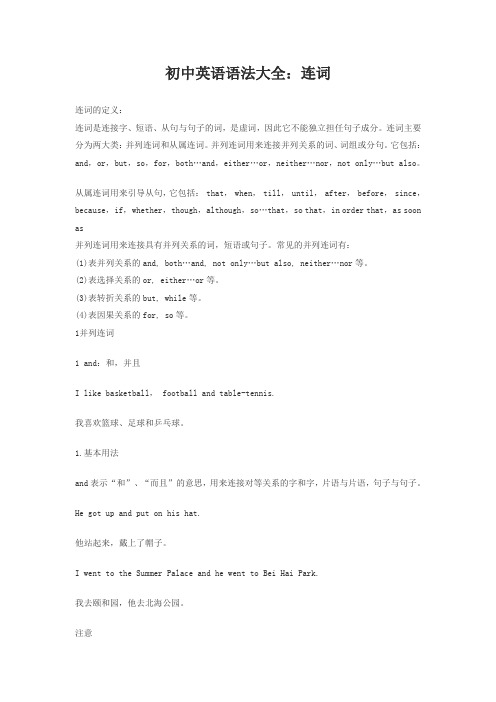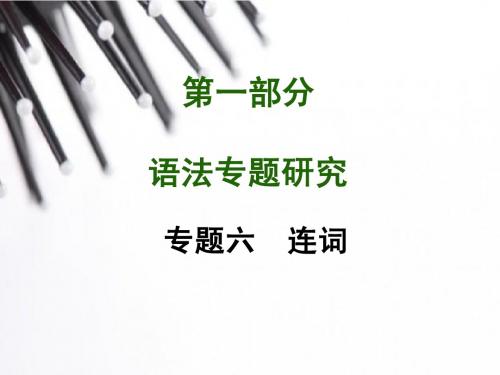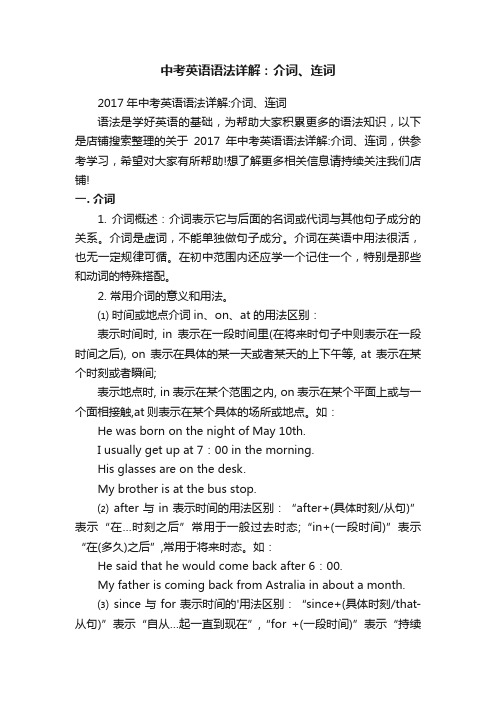初中语法 (6)连词
初中连词的技巧和方法

初中连词的技巧和方法连词是连接词语、词组或句子的词汇,起到组织句子结构、表达逻辑关系等作用。
在写作中,正确使用连词能够使文章结构紧凑、逻辑清晰,进而提高文章的可读性和可理解性。
下面是初中连词的技巧和方法,希望对你有所帮助。
1. 并列连词(and,but,or,so,yet,for):用于连接并列的词语、词组或句子。
使用并列连词时,要注意两个要点:a) 并列连词的使用应当符合句子的语义逻辑关系。
例如:and用于表示并列、附加,but用于表示转折、对比,or用于表示选择、否定,so用于表示因果关系、结果,yet用于表示转折、对比,for用于表示原因。
b) 并列连词连接的句子要在语法上保持一致。
例如:He likes playing football, swimming and running.(对)He likes playing football, to swim and run.(错)2. 递进连词(also,besides,furthermore,moreover,in addition):用于表示递进关系,进一步补充说明。
例如:Besides studying hard, he also participates in various extracurricular activities.3. 因果连词(because,since,as,thus,therefore,hence):用于表示因果关系。
例如:Because it was raining heavily, we decided to stay at home.4. 条件连词(if,unless,whether):用于表示条件关系。
例如:If you don't study hard, you won't pass the exam.5. 让步连词(although,though,even though):用于表示让步关系。
人教版九年级英语全册连词表

人教版九年级英语全册连词表以下是人教版九年级英语全册中常用的连词表。
这些连词可以帮助学生更好地理解和运用英语。
记住,在使用连词时,要注意上下文和语法的正确性。
一、并列连词 (Coordinating Conjunctions)1. and - 和and - 和2. but - 但是but - 但是3. or - 或者or - 或者4. so - 因此so - 因此5. for - 因为for - 因为二、从属连词 (Subordinating Conjunctions)1. if - 如果if - 如果2. when - 当when - 当3. because - 因为because - 因为4. although - 虽然although - 虽然5. while - 尽管while - 尽管三、并列副词 (Correlative Adverbs)1. both...and - 既...又both...and - 既...又2. either...or - 要么...要么either...or - 要么...要么3. neither...nor - 既不...也不neither...nor - 既不...也不4. not only...but also - 不仅...而且not only...but also - 不仅...而且四、时间连词 (Temporal Conjunctions)1. before - 在...之前before - 在...之前2. after - 在...之后after - 在...之后3. while - 当...的时候while - 当...的时候4. when - 当...时候when - 当...时候5. until - 直到until - 直到五、因果连词 (Causal Conjunctions)1. because - 因为because - 因为2. since - 由于since - 由于3. as - 由于as - 由于4. so - 所以so - 所以5. therefore - 因此therefore - 因此以上是人教版九年级英语全册中常用的连词表。
初中语文语法知识 词性(连词)

连词记忆口诀
连接词语和与或, 平等换位涉两者。 连接分句在主前, 不能主前不是连。
实战练习
• 下列各句中,加横线词语的词性判断正确的一项是( ) (1)他只说了一句话:“我不能走。” (2)上边和下边的有几堆火都没有熄。 (3)为了她,我愿付出一切。 (4)喂,你听见了没有?
• A.(1)连词 (2)介词 (3)副词 (4)拟声词 • B.(1)介词 (2)连词 (3)副词 (4)叹词 • C.(1)副词 (2)连词 (3)介词 (4)叹词 • D.(1)副词 (2)介词 (3)连词 (4)拟声词 • 答案:C
初中语文语法知识---词性
连词
• 一、用法:连词用来连接词语或分句,帮助表达某种关系。 • 二、连词种类:
• (一)词语连词:最具代表性的是“和”“或”,分别表示二者并列 或二者择一。以及与之表达同样意思的“与、同、跟、及、以及、并 且、或者、而”等。
• 例句:我和他都在二班。 • 我或者他会成为冠军。
感谢您的聆听!
• (三)分句连词,连词可以出现在主语的前边。凡是联结分句时不能 用在主语前边的词,不是连词。因此,许多关联词语的前半部分是连 词,后半部分是副词,下面举例说明。
• 如:无论他让不让我去,我都要去。 • 只有他不让我去,我才不去。
• 只要天不下雨,运动会就照常进行。 • 不管天下不下雨,会议都照常进行。 • 既然拿来了,我就不再拿回去。 • 如果你不让他去,他就不去。
• 如:不但……而且、或者……或者、要么……要么、因为……所以、与 其……不如、因此、如果、即使、只有、只要、无论、不管、以便、 以免、那么、而。
• 例去,所以我也不去。
• 虽然他不让我去,但是我偏要去。
• 三、连词的特点: • (一)只有连接作用,没有修饰作用。 • 如:刚才的人是你,还是他? • 这一句的“还”具有修饰作用,不是连词,而是关联副词。 • (二)词语连词,连接的双方不能互换位置的,不是连词。
初中英语语法大全:6 连词

初中英语语法大全:连词连词的定义:连词是连接字、短语、从句与句子的词,是虚词,因此它不能独立担任句子成分。
连词主要分为两大类:并列连词和从属连词。
并列连词用来连接并列关系的词、词组或分句。
它包括:and,or,but,so,for,both…and,either…or,neither…nor,not only…but also。
从属连词用来引导从句,它包括: that, when, till, until, after, before, since,because,if,whether,though,although,so…that,so that,in order that,as soon as并列连词用来连接具有并列关系的词,短语或句子。
常见的并列连词有:(1)表并列关系的and, both…and, not only…but also, neither…nor等。
(2)表选择关系的or, either…or等。
(3)表转折关系的but, while等。
(4)表因果关系的for, so等。
1并列连词1 and:和,并且I like basketball, football and table-tennis.我喜欢篮球、足球和乒乓球。
1.基本用法and表示“和”、“而且”的意思,用来连接对等关系的字和字,片语与片语,句子与句子。
He got up and put on his hat.他站起来,戴上了帽子。
I went to the Summer Palace and he went to Bei Hai Park.我去颐和园,他去北海公园。
注意单词或词组如果是三个以上连接,一般在最后的单词或词组前加and。
另外“and”在译成中文时不一定要翻译出“和”来。
2.特别用法:and在祈使句中的作用句型:祈使句,and…=If you…,you'll…Use your head,and you'll find a way.动动脑筋,你就会想出办法来。
中考英语语法突破【专题6】连词知识点总结归纳ppt课件(42页)

者„„;Both...and...两者都……; Not only... but
also... 不但 „„而且„„ 。由后句可知,两者中 只有一个可以去舞会。故选B。
4. —Who’ s the girl under the tree? —Oh, she is my Chinese teacher. She is ____ a teacher ____ a singer.
your party, because one of them must
stay at home to look after the baby. A. Neither; nor B. Either; or C. Both; and D. Not only; but also
【解析】 考查并列连词的用法。句意为 : ____ Bill ____ Tom去参加你的聚会,因为他们中的一 个 必 须 待 在 家 里 照 看 宝 宝 。 Neither...nor... 既 不 „„ 也 不 „„ ; Either...or... 或 者 „„ 或
【解析】考查并列连词的用法。句意为:你喜 欢用哪一种方式与朋友保持联系, QQ____MSN? and并,和,表示顺承关系;but 但是,表示转
折关系;or 或者,表示选择关系;so因此,表
示因果关系。根据题意可知C项正确。故选C。
2. Smile to the world, ___ the world will smile back to you. A. nor C. or
B. but
D. and
【解析】考查并列连词的用法。句意为:笑着面对 这个世界, _____ 世界也将回馈给你微笑。 nor 也
不;but但是,表转折;or或者,表选择;and和,
中考英语语法详解:介词、连词

中考英语语法详解:介词、连词2017年中考英语语法详解:介词、连词语法是学好英语的基础,为帮助大家积累更多的语法知识,以下是店铺搜索整理的关于2017年中考英语语法详解:介词、连词,供参考学习,希望对大家有所帮助!想了解更多相关信息请持续关注我们店铺!一. 介词1. 介词概述:介词表示它与后面的名词或代词与其他句子成分的关系。
介词是虚词,不能单独做句子成分。
介词在英语中用法很活,也无一定规律可循。
在初中范围内还应学一个记住一个,特别是那些和动词的特殊搭配。
2. 常用介词的意义和用法。
⑴ 时间或地点介词in、on、at的用法区别:表示时间时, in表示在一段时间里(在将来时句子中则表示在一段时间之后), on表示在具体的某一天或者某天的上下午等, at表示在某个时刻或者瞬间;表示地点时, in表示在某个范围之内, on表示在某个平面上或与一个面相接触,at则表示在某个具体的场所或地点。
如:He was born on the night of May 10th.I usually get up at 7:00 in the morning.His glasses are on the desk.My brother is at the bus stop.⑵ after与in表示时间的用法区别:“after+(具体时刻/从句)”表示“在…时刻之后”常用于一般过去时态;“in+(一段时间)”表示“在(多久)之后”,常用于将来时态。
如:He said that he would come back after 6:00.My father is coming back from Astralia in about a month.⑶ since与for表示时间的'用法区别:“since+(具体时刻/that-从句)”表示“自从…起一直到现在”,“for +(一段时间)”表示“持续一段时间”,都常用于完成时态;如:My father has worked in this factory since 1970.My father has worked in this factory for over 30 years.⑷ by、in与with表示方式的用法区别:都可以表示“工具、手段”,但是by主要表示“乘坐”某个交通工具或“以……方式”,在被动句中可以表示动作的执行者;in表示“使用”某种语言/文字,with表示“使用”某个具体的工具、手段。
中考语法专题之连词(含练习及答案)

连词一、定义与分类连词是用来连接词与词、短语与短语、句子与句子的词。
它属于虚词,在句子中不单独用作句子成分。
连词按其性质可以分为并列连词和从属连词。
并列连词用于连接并列的单词、短语、从句或句子,如and,or,but,so,for等。
主要用于表示并列、转折、选择、因果关系。
从属连词用于引导主语从句、宾语从句、状语从句等,如that,whether,if,as soon as,because,although等。
二、常见并列连词的用法(1)连词and的用法要点基本意思为“和”“又”“而且”等,但它有时还可表示对比或转折,相当于汉语的“而”“但”“却”。
1.and表示联合,译为和,又,而且。
Lucy and I go to swimming once a week. 我和露西每周游泳一次。
2.and用来连接两个动词或动词词组,表示动作先后发生,译为然后。
Go along the street, and take the second turning on the left. 沿这条街走,然后在第二个路口左拐。
3.and用于连接两个相同的比较级,表示越来越……。
It moves faster and faster. 它移动得越来越快。
4.and用于连接两个相同的动词或副词,表示动作的反复或连续。
He tried and tried but failed. 他试了又试,但是失败了。
He kept moaning on and on.他呻吟不已。
5.and用于祈使句之后,表示结果,译为那么。
Work hard and you’ll pass the exam. 努力吧,那么你会考试及格的。
(= If you work hard, you will pass the exam. )6.在口语中,and常用在go, come, try, run, stop等动词后,连接另一个动词,表示目的。
此时and相当于不定式符号to,不必译出。
2020届中考英语语法专项训练:(六)连词(含答案)

(六)连词Ⅰ.词汇运用。
A)根据句意及首字母提示填写单词。
1.You'll never know unless you try.2.Mr.Smith didn't give us a lecture because he was ill.3.The students didn't go home until they finished their homework.4.I like apples while my brother likes bananas.5.I don't know whether it will rain tomorrow.B)根据句意,用适当的连词填空。
6.Peter spent half a day fishing by the river,but he didn't catch anything.7.Give him more time,and he will find the answer to the question on his own.8.My clock didn't go off this morning,so I didn't arrive at school on time.9.We all know that Mike is not an officer,but a brave soldier.10.The story mainly tells us that if we work hard,we won't fall behind.11.My mom always cooks chicken soup for me because it's good for my health.12.I'm sorry.I forgot to take out the rubbish when I left home in the morning.13.Though/Although he is only seven years old,he knows a lot about science.Ⅱ.单项选择。
- 1、下载文档前请自行甄别文档内容的完整性,平台不提供额外的编辑、内容补充、找答案等附加服务。
- 2、"仅部分预览"的文档,不可在线预览部分如存在完整性等问题,可反馈申请退款(可完整预览的文档不适用该条件!)。
- 3、如文档侵犯您的权益,请联系客服反馈,我们会尽快为您处理(人工客服工作时间:9:00-18:30)。
初中语法总结及练习〔六〕连词连词用来连接词,短语,从句或句子。
连词在句中(能/不能)单独使用。
连词可分为两类:并列连词和从属连词。
1)并列连词※表并列关系:and, both… and/not only… but (also)/as well, neither.. nor ※表转折关系:but, yet, however, still, while※表选择关系:or, either… or ※表因果关系:for, so, therefore2)从属连词用来引导从句※表时间:as/ when/while, before/after, till/until, since, as soon as※表地点:where(ever) ※表条件:if/unless(除非)※表原因:because/as/since/now that !because与so不能连用※表比较:than, as…as…/not as(so)…as/※表让步:(al)though/even if(though) ! although与but不能连用※表目的:so that/ in order that ※表结果:so/such… that…※表方式:as/as if (though) ※引导名词从句:that, if, whether3)常用连词的用法辨析※While, When, As三个连词都可引导时间状语从句如:As/When/While I was walking down the street I noticed a police car.(表示某事进行中,又发生了另一事)但各词用法有所不同。
①While常用表同时进行的两个长动作。
如:While mother was cooking lunch, I _________ (do) my homework. ②When常用表示两动作先后发生。
如:When(after) he (had) finished his work, he took a short rest. ③当从句是瞬间动词,主句是延续动词时,从句用when。
如:When John arrived, I ______(cook) lunch. ④As常用来表示发展变化的两个动作。
如:As the days get longer in the day, the nights get shorter in summer.⑤As还可用来表示同时发生的两个短动作。
如:She looked behind from time to time as she rode her bike home.※As, Because, Since , For这四个词都可表原因,但用法有区别。
①Because引导的从句往往放在句___,表直接原因。
如:I stayed at home because it rained. ②As和Since 引导的从句一般放在句___,表原因已被人们所知。
如:Since everybody is here, let’s begin. ③for用来补充说明理由,____(可/不可)放在句首。
如:The spring comes, for the grass is green.※if, whether都可作“是否”讲,引导宾与从句时可互换。
下列情况下,不能用if,只能用whether ①引导__语从句Whether he will come to the party is unknown. ②引导____语从句The question is whether I can pass the exam.③在___前。
I haven’t made up my mind whether to go there or not.※either…or…, neither…nor, not only…but also…这三个连词词组连接两个并列主语时,谓语动词要随相邻的主语变化。
例如:Either you or he____ (be) wrong. Neither Mr. Black nor his children ______ (enjoy) fish. Not only the teacher but also the students ____________ (be) to Shanghai World Expo already.专项训练1. --Will the foreigners have any problems talking with Chinese in Shanghai?--I don’t think so. Now ______ the young ______ the old can speak some English.A. either…orB. not only… but alsoC. neither…norD. both…or2. We didn’t catch the train _______ we left late.A. soB. becauseC. butD. though3. Tom failed in the exam again _______ he wanted to pass it very much.A. ifB. soC. thoughD. as4. I won’t believe that the five-year-old boy can read five thousand words ______I have tested him myself. A. after B. when C. if D. until5. The book was so interesting that he had read it for three hours ______ he realizedit. A. when B. until C. after D. before6. ---This dress was last year’s style.---I think it still looks perfect ______ it has gone out this year.A. so thatB. even thoughC. as ifD. ever since7. Hurry up, _______ you will miss the train.A. andB. soC. howeverD. or8. The mountain was ______ steep(陡峭) _____ few people reached the top.A. so…asB. so…thatC. as…asD. too…to9. --Do you remember our pleasant journey to Xi’an?--Of course. I remember everything ______ it happened yesterday.A. as soon asB. even thoughC. rather thanD. as if10. ______ you can’t answer this question, we have to ask someone else for help.A. AlthoughB. WhileC. WhetherD. Since11.--I don't like chicken ___ fish.--I don't like chicken, ___ I like fish very much.A. and;andB. and;butC. or;butD. or;and12. Ricky caught a bad cold yesterday, ___________ he had to stay at home.A. becauseB. butC. orD. so13. Study hard, ________ you'll pass the exam.A. orB. andC. butD. because14. We have been good friends ________we joined the same ping-pong team.A. afterB. beforeC. sinceD.until15.None of the shoes in the shop fit me well. They are ___too big____ too small.A. both; andB. either; orC. neither; norD. not only; but also16. Please take the medicine three times a day, _______ it won’t work well.A. andB. butC. orD. so17. Hurry up, Jack. We have to get to the station before 11:45 _____ we can catchthe12:00 train. A. since B.after C. as soon as D. so that18. —I hear a new film is on. Shall we go to the cinema together, Lucy and Lily?—___Lily___ I will go with you because one of us must be at home.A. Either, norB. Either, orC. Neither, norD. Both, and19. How did you try to get to school on time ______ you missed the school bus, Mary?A. whenB. ifC. onceD. that20.--I'm going to the supermarket. -Will you get me some chocolates ______ you are there, mum? A. since B. because C. if D.while21.Never give up, ______ you'll make it. A. and B. but C. or D. yet22.Her grandparents are still in good health________ they are over eighty.A. thoughB. as soon asC. untilD. because23. -- Would you like to come to dinner tonight?-- I'd like to, ___ I'm too busy. A. and B. so C. as D. but24. When I got the news that the ship would sink(沉没), I was _____ frightened_______my legs couldn't move forward.A. so; thatB. very; thatC. too; thatD. too; to25.Be careful , ___________ you will fall off the tree.A. soB. orC. butD. and26. Mr. Brown knows little Japanese, _______ he can't understand the instructionson the bottle of the pills. A. so B. or C. butD. for27. ______ my father ______ my mother are teachers.A. Neither… norB. Both… andC. Either… orD. Not… but28. The baby is only three months. He can _____ read _____ write.A. neither, norB. either, orC. both… andD. not… but29. I didn’t watch TV _____ I finished my homework.A. afterB. whenC. whileD. until30. The train started to move away faster ____ faster. A. or B.but C. as D. and31. _____ I got home, my parents were reading newspapers.A. As soon asB. BeforeC. AfterD. When32. Take the medicine ____ you go to bed. A. until B. before C.because D. after33. I’ll give the letter to her _____ she comes back.A. untilB. as soon asC. beforeD. since34.My aunt asks whether I like a woolen sweater ___ a cotton one.A. butB. orC. andD. not35. We ran to the trees, ___ we couldn't see any more monkeys.A. butB. soC. andD. for36. ___ Li Ping ___ Wu Fang ___ League members.A. Neither; nor; areB. Either; nor; isC. Both; and; areD. Neither; or;is37. You can ____ stay at home ____ go out to play.A. either; orB. so; thatC. neither; andD. both; and38. ___ Monday___ Tuesday is QK, I will be free then.A. Either; orB. Neither; norC. So; thatD. Both; and39. ___ my brother____ sister are doctors.A. Not; butB. Neither; norC. Both; andD. Either; or40. The teacher, as well as his students ___ football. A. like B. likes C. enjoyD. play41.The doctor, along with these nurses____ sent to the country.A. areB. wereC. haveD. was42. My sister, together with her classmates____ interested in the new book.A. areB. wereC. isD. have43. ___ she ___ I know his telephone number, because it has been changed.A. Both; andB. Either; orC. Not only; but alsoD. Neither; nor44. ___ Jack ____ Tom watched TV yesterday evening because they werebusy with their lessons.A. Both; andB. Not only; but alsoC. Not; butD. Neither; nor45. None of the shoes are the right size. They are ___ too big ____ too small.A. or; orB. either; orC. neither; orD. both; and46. When Lily was three, she could____ read____ write.A. not; butB. not; andC. neither; norD. either; or47. We should learn ___ from books___ from workers and farmers.A. both; andB. either; orC. neither; norD. as; as48. Last week we saw ____ Li Ming ___ Mary.A. neither; orB. either; norC. all; andD. not; but49. My mother bought not apples____ two interesting books for me.A. orB. butC. andD. so50. Our teacher is very busy, ____ he often help us with our lessons.A. orB. butC. andD. though。
